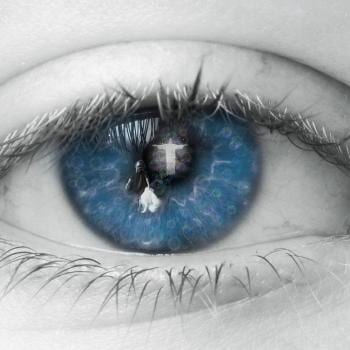
I’ve already written about how church communities can support people who’ve gone through religious trauma. Churches can do much better.
Today, I want to address the ways trauma survivors can take responsibility for our actions. I don’t mean taking responsibility for our trauma. That’s never our fault. But sometimes we engage in harmful actions while reacting to that trauma, and we are never justified in harming others. It’s important for us trauma survivors to take responsibility for any destructive behaviors we may be engaging in because we haven’t dealt with our trauma.
Years ago, a man used to come into my office every day. He’d usually stick around and talk to me for a while before heading back out on the job. Early on, he made it clear that he didn’t like women. He was always kind to me, and he would even bring me baked goods and movies he thought I’d enjoy borrowing, but he would also make misogynistic comments every other time he came by.
He’d come up with all sorts of reasons why women couldn’t be trusted, and none of those reasons were the least bit reasonable. After a while, he talked about his wife abandoning him to raise their children on his own. A long time after that, he made a passing comment about an abusive grandmother.
He wasn’t being reasonable in his dislike of women. He was reacting to women from a place of unhealed trauma.
I’ve seen this play out in a lot of different ways, but I want to specifically address religious trauma here.
We usually don’t think about religion giving a person PTSD. It sounds strange, right? If we stop and think about it, though, it’s not strange at all. How many people have grown up in abusive homes with a parent or two who justified their abuse with the Bible? How many people have attended churches with abusive leaders who used God to manipulate their congregants? How many people have been indoctrinated with the types of beliefs that give them panic attacks in the middle of the night?
It’s a lot of people, y’all.
If a person is able to leave those kinds of toxic environments, it can be hard to adjust. We still carry around those wounds, even if we aren’t currently being wounded.
Those old wounds can be unexpectedly reopened when something “triggers” that past trauma to reactivate in our brains. It’s a painful experience, and it can be difficult to learn how to manage.
The fact that a person has trauma triggers isn’t their fault. They didn’t cause their trauma. However, it is on each of us to learn how to manage our reactions without putting a large burden on others.
I’m all in favor of including common trigger warnings for topics that are generally accepted to often cause issues: rape, abuse, domestic violence, war violence… But we don’t all have the same triggers. We can, and should, use general trigger warnings when possible, but we can’t possibly cover every single person’s potential triggers.
I’m constantly surprised at the things that cause my heart to start racing. How can I expect someone else to avoid all of my triggers when I don’t even know what all of them are myself?
This is why we trauma survivors need to take some responsibility, not for our trauma, but for our own actions.
If someone makes a comment that enrages me, maybe it’s because that person is being a total jerk. Maybe it’s because I’m misunderstanding him because I’m listening through the noise of my past trauma.
Years ago, I couldn’t “hear” Christians. When someone would start talking about God, alarms would go off in my head and all of my defenses would go up. They could have been saying the kindest thing to me, but all I could hear was judgment and hypocrisy. That response was because of my past trauma. I felt that anyone who used words like, “salvation” or “grace” were dangerous to me, so when someone I perceived as dangerous would show up, I’d get defensive. They were using language that I associated with dangerous people, so that made them dangerous to me, no matter what their actual intentions were.
I can’t even count the number of times I’ve been agreeing with someone only for them to attack me because I either used language they associated with danger or I reminded them of someone who had hurt them in the past. They were obviously in the “fight” mode of the fight/flight/freeze trauma response.
It’s important for us to understand when we’re being triggered. We need to realize that sometimes we aren’t interpreting what another person is saying fairly because all we can see is “the enemy” in that moment.
There’s a difference between a person who is obviously being hostile toward you and a person who innocently says something triggering. If a person is purposefully being hurtful, that’s on them. If a person isn’t purposefully being hurtful, then your reaction is your own to manage. My emotional reaction, and how I choose to handle that, is not someone else’s responsibility.
Living through trauma can make us feel like we don’t have control. We certainly didn’t have control of our lives during the traumatic event or events. It’s important for trauma survivors to understand we do have control of how we react. Thinking that we have no control over our emotional reactions is part of our traumatic wound. We may not be able to control whether or not our heart starts racing after being triggered, but we absolutely do have control over how we respond to someone who has said or done something triggering. We aren’t puppets being controlled by the past.
A problem I’ve noticed, especially in online spaces, is that people with traumatic pasts will sometimes lash out and hurt others while using their trauma to excuse that behavior. That’s unacceptable. Plenty of people have dealt with serious trauma without turning around and harming others. Having a traumatic past doesn’t give anyone a free pass to hurt others.
If we recognize we have a traumatic past, and we recognize that sometimes our reactions are driven by our trauma and not by what’s actually happening in front of us, how do we handle ourselves when confronted with a person who is doing or saying something triggering?
I try to run through a quick checklist in my head before responding to a situation like that:
- Is this statement a problem to me, personally, or is this likely a problematic statement for an entire group of people?
- Is this person being purposefully hurtful or does it seem like they aren’t aware this statement could be hurtful?
- What is it about this statement that bothers me? Is it bothering me because it reminds me of hurtful interactions I’ve had in the past? Am I hearing what this person intends to say or am I hearing what I assume they must be saying, based on my own traumatic past?
- Is this person truly my enemy or does this person just remind me of someone who was my enemy?
- Could I reasonably expect this person to know their statement was problematic for me or for others?
After evaluating why I’m feeling what I’m feeling, sometimes I just ignore the comment. I might engage the person, but only if:
- I believe I can keep my emotions under control and not resort to insulting the other person if I get angry.
- This person seems like someone who would be willing to listen. Having an existing relationship with this person is important.
- The statement isn’t just problematic for me personally, but is recognized as something that is problematic for an entire group of people (and that group of people largely agrees it’s problematic and it’s not just my personal preference.)
- I give myself permission to exit the discussion at any time if it’s too much of an emotional drain on me.
It’s important for us to accept our emotional responses without placing the blame for those emotions on the person who triggered the response. The blame for our trauma is on the person or people who traumatized us. It might be safer to take our anger out on people who had nothing to do with it, but it’s not healthy.
When someone makes a comment on Twitter or Facebook that makes me angry, that’s my emotion and I need to own that emotion as well as take responsibility for anything I choose to do with that emotion. If I choose to have a social media meltdown all over them, I’m responsible for that.
The person who said something triggering is responsible for their words and actions, though many times what they’re saying is perfectly fine outside our individual trauma context. We are responsible for the ways we react.
I’m not saying we shouldn’t be firm or we shouldn’t speak up when appropriate. I’m not saying we shouldn’t call out systems of oppression. I’m not saying we should tolerate comments that are obviously problematic.
I’m saying we shouldn’t overreact to what we imagine someone means by their comment. I’m saying we shouldn’t turn allies into enemies based on what we assume they must mean because we’re misinterpreting them through the lens of our past trauma.
There are productive ways of dealing with our trauma and there are deeply unhealthy and unproductive ways of staying in that trauma by not addressing the root issues and instead remaining in these fight/flight/freeze patterns.
The healthiest move isn’t to go around confronting everyone who triggers our PTSD symptoms, as if they need to be held personally accountable for the trauma we endured. The healthiest move is to actively work on ourselves, however we need to do that. After we’ve done that work, and we’ve learned to recognize when we’re reacting out of our trauma in an unhealthy way (such as disliking all women, hating all Christians, seeing everyone who reminds you of someone who hurt you as an enemy you have to battle…), then we can find healthy ways of engaging the people who have (almost always unknowingly) triggered a PTSD response.
Disclaimer: I am not a mental health professional. If you need help processing your trauma, please see a mental health professional. I’m just not equipped to do what a therapist could do for you.
Sign up with your email or follow me on Twitter or Facebook to keep up with new posts.












